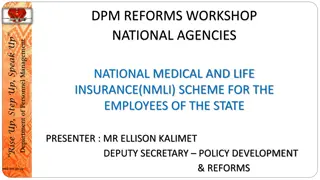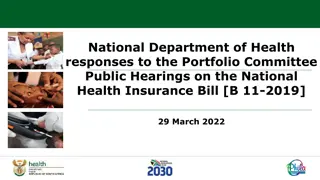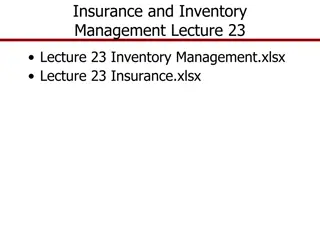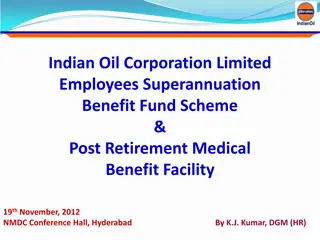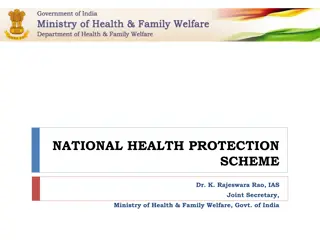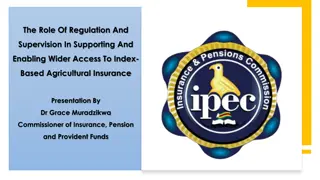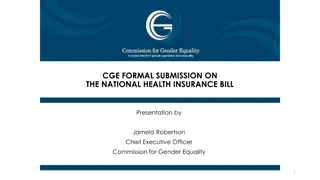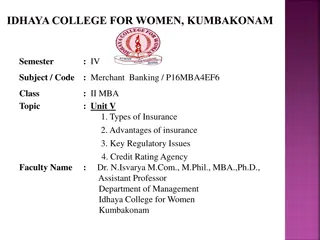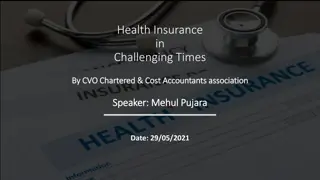Overview of National Health Insurance Scheme in South Africa
The National Healthcare Professionals Association of South Africa presents a comprehensive overview of the country's National Health Insurance scheme, highlighting key aspects such as the organization's role, historical context from documents like the Freedom Charter, ANC and Government resolutions, constitutional mandates, and the disease burden in South Africa. The presentation delves into the association's mission, objectives, and recommendations for transforming the healthcare system towards equity and accessibility.
Download Presentation

Please find below an Image/Link to download the presentation.
The content on the website is provided AS IS for your information and personal use only. It may not be sold, licensed, or shared on other websites without obtaining consent from the author. Download presentation by click this link. If you encounter any issues during the download, it is possible that the publisher has removed the file from their server.
E N D
Presentation Transcript
1 NHCPA NATIONAL HEALTHCARE PROFESSIONALS ASSOCIATION SOUTH AFRICA S NATIONAL HEALTH INSURANCE SCHEME PRESENTED BY: DR. BENNY MALAKOANE (NHCPA PRESIDENT)
2 TABLE OF CONTENTS Who we are Context from Freedom Charter ANC and Government Lekgotla Constitutional mandate South Africa s disease burden WHO reforms World Health report White Paper on transformation of health Six core standards NHI in context Problem statement Dilemma Recommendations Questions
3 WHO WE ARE: National body of healthcare professionals who dwell among the community of progressive motive forces of our society. We are present in 8 provinces. We are agents for health reforms and a vanguard movement for healthcare equity and transformation. We are your consultative forum and your go to partner for driving system change in support of progressive endeavors.
4 CONTEXT FROM THE FREEDOM CHARTER The Freedom Charter (26 June 1955) says: There shall be housing, security and comfort: A preventative health scheme shall be run by the State and; Free medical care and hospitalisation shall be provided for all with special emphasis on mother and child care.
5 ANC AND GOVERNMENT LEGOKTLA (2012) In the NSDA and the ANC Lekgotla Resolutions, nine Outputs were agreed as a fulcrum upon which healthcare service delivery will rest upon: six form the wave of deliverance that shall be stirred through improvement of health systems effectiveness by: Universal coverage and progressive implementation of NHI Improvement of Quality of Health care Implementation of PHC Re-engineering Reduction of healthcare costs Improvement of human resources for health Improvement of management and leadership
6 CONSTITUTIONAL MANDATE Section 27,1(a) of the Constitution (Act 108 of 1996), states inter alia; everyone has the right to have access to health care services, including reproductive healthcare .The State must take reasonable legislative and other measures within its available resources, to achieve the progressive realisation of each of these rights. No one shall be refused emergency medical treatment
7 SOUTH AFRICA S DISEASE BURDEN Disease Profile of South Africa: (Lancet) The Lancet (2013) posed a question of whether South Africa is geared towards a better future when its plagued by a quadruple burden of disease? Quintuple ?, Sextuple ? Viz; HIV/AIDS and TB Maternal, new-born and child health Non-communicable diseases Violence and injury Mental health disease CoVID
8 WHO (2007) Health Reforms Service delivery Access Improved health Health workforce Coverage Responsiveness Information Social & financial risk protection Medical products Improved efficiency Financing Quality Leadership Safety
9 World Health Report (2007) It shows how the world is at increasing risk of disease outbreaks, epidemics, industrial accidents, natural disasters and other health emergencies which can rapidly become threats to global public health security. The report explains how the revised International Health Regulations (2005), which came into force, helps countries to work together to identify risks and act to contain and control them. The regulations are needed because no single country, regardless of capability or wealth, can protect itself from outbreaks and other hazards without the cooperation of others. This a collective aspiration and a mutual responsibility.
10 White Paper on transformation of the Health System for South Africa Notice 667 of 1997 Advocated for a unified health system in South Africa Decentralization of management of health services (DHS) Increasing accessibility to PHC for all citizens Strengthen disease prevention (IMCI, EPI) Implement integrated nutrition (MCWH) Information management system Others AND then
11 The Six Core Standards Reduced waiting times Staff attitude Availability of medicine Ideal Clinic Concept Cleanliness Infection control Patient and staff safety
12 NHI in Context It is a health financing system based on resource pooling and social solidarity. It is consistent with Freedom Charter, the Constitution, the White paper on health systems, and WHO reforms and IHR. Intended to achieve universal coverage where every citizen will have the right to access quality health services, and that access shall not be determined by the socio-economic status of anyone especially the poor. It recognizes that health is a social investment and a public good and will contribute to better quality of life and improved health outcomes.
13 PROBLEM STATEMENT Fragmentation of funding pools and occupational categorizations between public and private sectors. RSA spends 8.5% of GDP on health, and 4.1% is spent o 84% of the population while 4.4% is spent on only 16% of the population that can afford and are on medical schemes since 2015/16. Inevitable OOP expenses on healthcare as influenced by: - Long waiting times, co-payments, exhausted medical funds, responsiveness of private providers Burden of disease is rising or worsening
14 DILEMA While NHCPA supports all the 8 founding principles of NHI, including the population coverage, service coverage and cost coverage; the intended time for implementation is long overdue. Processes are protracted and slow viz: 1. Reorganization of the health system post assessments of impact in the pilot districts 2. Financing mechanisms for NHI still in infancy and rhetorical theory 3. Primary healthcare re-engineering dis-/unorganized in provinces 4. Governance systems not yet in place or fully functional (OHSC, Commission, NHI Fund, accreditations and contracting of providers, 5. Provider reimbursement mechanisms not in place 6. Information systems not yet adequate or fully in place
15 DILEMA: continues There is no independence of the board as it will be appointed by the minister as stipulated in the white paper. Unfortunately following the finilisation on NHI it will be the biggest parastatal in the country and given government track record with parastatals, one has to be really concerned. There is very little improvement of public infrastructure at the moment, meaning that we will still see inequality in patients who are allocated to public facilities as their designated service providers. The aging community is getting bigger and always poses as a significant threat for a model such as NHI. They need more health care with paying less taxes.
16 RECOMMENDATIONS The NHI Bill be assented to and the Act implemented NOW !!! NHI should be the only recognized fund for healthcare services in South Africa NHCPA be recognized as a partner and friend of the Portfolio Committee and will lay its resource-base to support; 1. Fast-tracking the phased-in implementation of NHI 2. The health system reorganization processes in Districts 3. Accreditation of providers and their reimbursement systems - Healthcare providers are READY 4. The strengthening of the four streams of PHC re-engineering 5. The strengthening of the health workforce
17 RECOMMENDATIONS: continues Set up an independent special NHI anti-corruption unit. Start improving public facilities. Direct fund to infrastructure development for the next 5 years. Making sure the process is healthcare professionals and community led Abolishment of medical aid system and have a insurance that covers only that which NHI cannot provide.
18 THANK YOU. Dr. Benny Malakoane NHCPA President

 undefined
undefined


